Avoid Puppy Scams: A Step-By-Step Guide To Finding Ethical Breeders
When you purchase through links on our site, we may earn a commission. Here’s how it works.
That tiny, trembling puppy in the photo? It didn’t get the best start. It was bred in filth, sold by a backyard breeder, and sick before it ever made it home.
Table of Contents
Every year, thousands of dog lovers get scammed by breeders who hide behind smiling websites and wagging tails. If you’re thinking of buying a dog, this guide could be the difference between raising a best friend and funding a nightmare.
It all starts with how to find a reputable dog breeder and how to avoid those who hide the truth.
Step 1: Know The Enemy — How Puppy Mills Fool You
You won’t find the words “puppy mill” on their website.
No filthy cages. No overcrowded kennels. And no frantic barking soundtrack.
What you’ll see instead? A smiling couple. A sunny yard. A handful of stock photos.
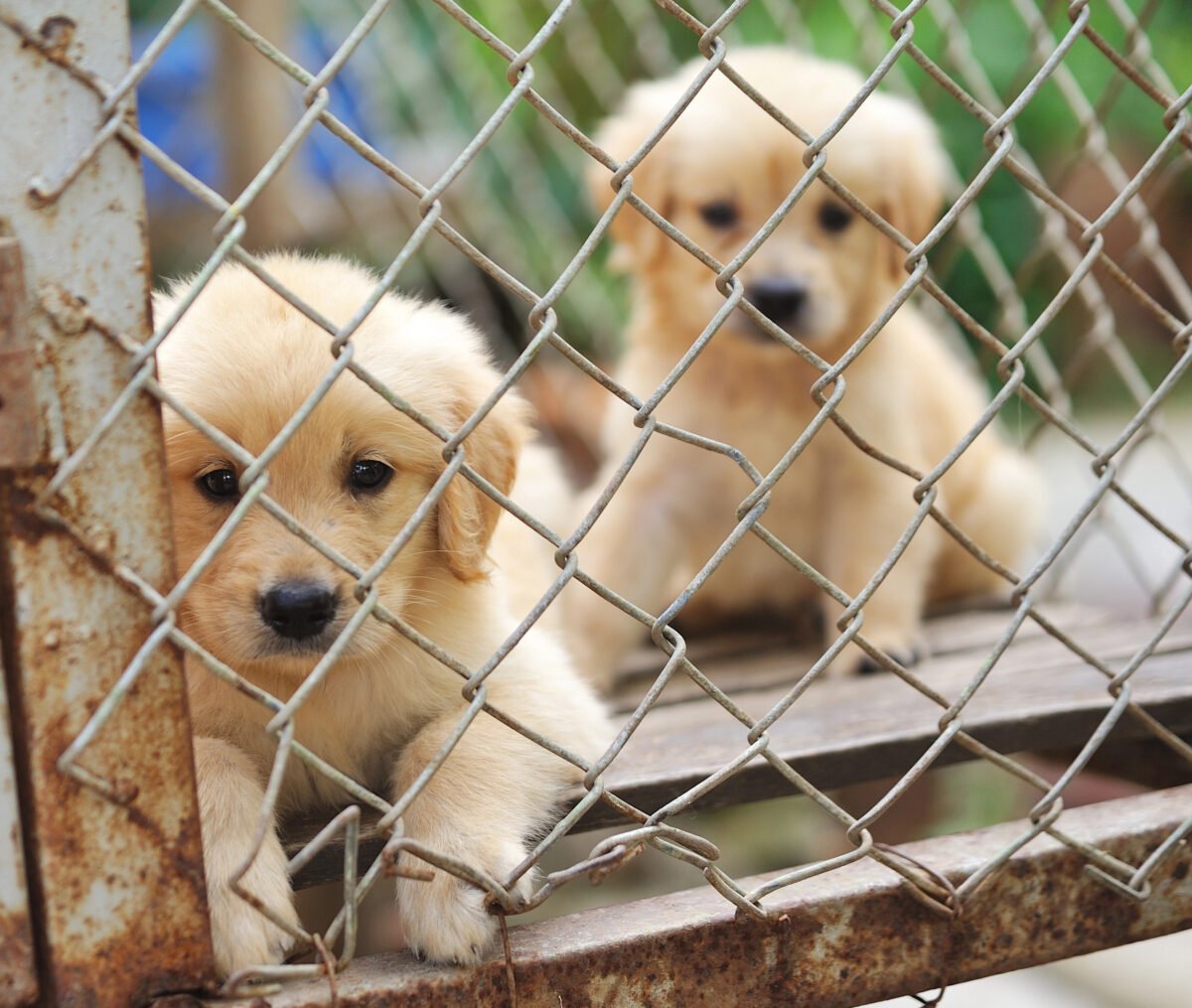
Puppy mills don’t look like horror stories at first glance. And that’s exactly the problem.
What Really Is A Puppy Mill?
Puppy mills are high-volume breeding operations built for profit, not care. They churn out litters with little thought for the mother, the health of the puppies, or your heartbreak later.
Inside, the dogs often live in wire-bottom cages. No comfort. No space. Many breeding females are forced to have litter after litter until their bodies give out.
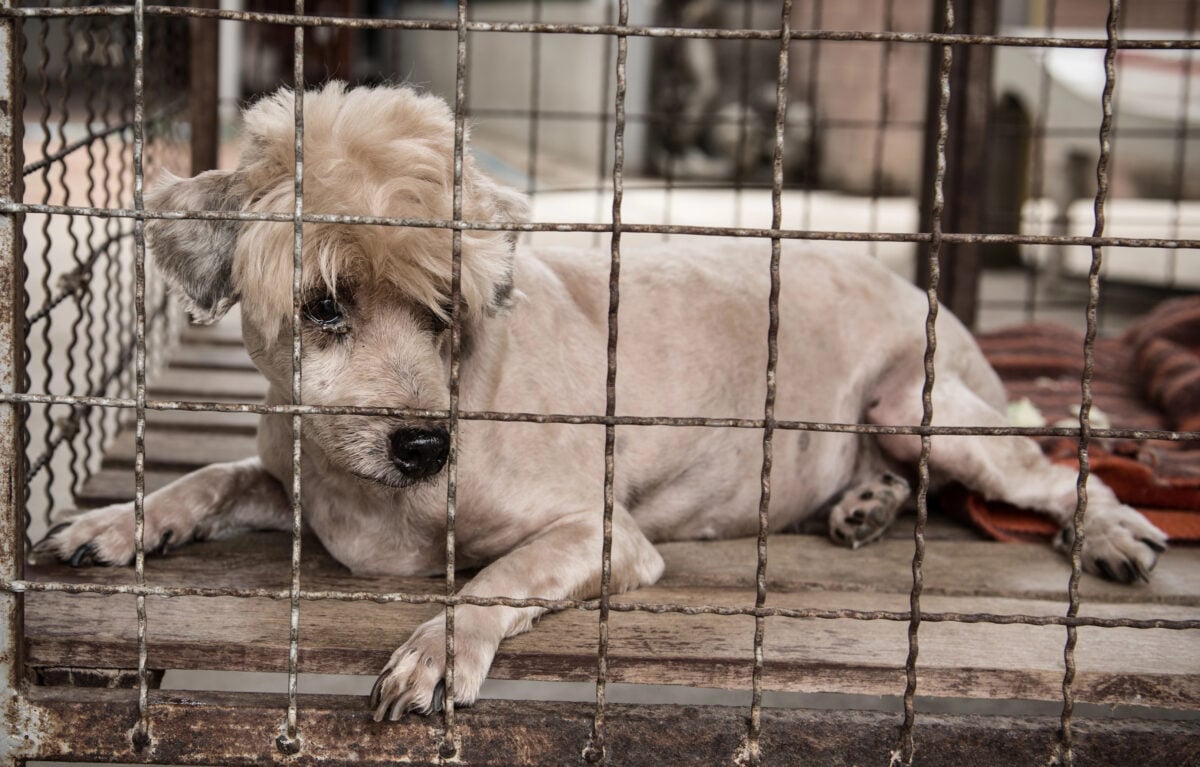
And the puppies? They’re often under-socialized, inbred, and sold off as fast as possible — sick or not. That “discount price” may come with a lifetime of vet bills and behavior issues.
Need To Know: Most puppy mills now operate online. They disguise themselves with clean branding, fast responses, and fake credentials. The cruelty is behind closed doors — until you bring it home.
Common Puppy Mill Tactics That Fool Buyers
You find the perfect puppy online.
The photo? Adorable. The breeder? Responsive. The price? Actually affordable.
Thousands of puppy buyers get scammed every year by sellers who know exactly what you want to hear. They’re not sloppy. They’re strategic.

Here’s how they get you to trust them:
- Beautiful websites filled with stock photos and fake testimonials
- “Only 1 left!” urgency to pressure a fast decision
- Too-good-to-be-true pricing paired with vague “health guarantees”
- Excuses for why you can’t visit or FaceTime with the puppy
- Pushy offers to “ship immediately” if you pay today
- Payment requests through Venmo, Zelle, or gift cards
The whole setup is designed to look polished, personal, and safe. But what they’re really selling is a lie. And sometimes, there’s no puppy at all.

Online puppy scams are exploding in 2025. Want to stay one step ahead? Here’s more details on how to spot fake listings, payment traps, and red-flag breeder websites before they cost you thousands.
Step 2: Learn How To Spot A Puppy Mill
Before you can learn how to find a reputable dog breeder, you need to understand how the bad ones operate. Puppy mills are masters of disguise.
Puppy mills rarely wave red flags at first glance. They show you what you want to see: healthy-looking puppies, friendly emails, maybe even a fancy logo. But dig a little deeper, and you’ll notice the cracks.
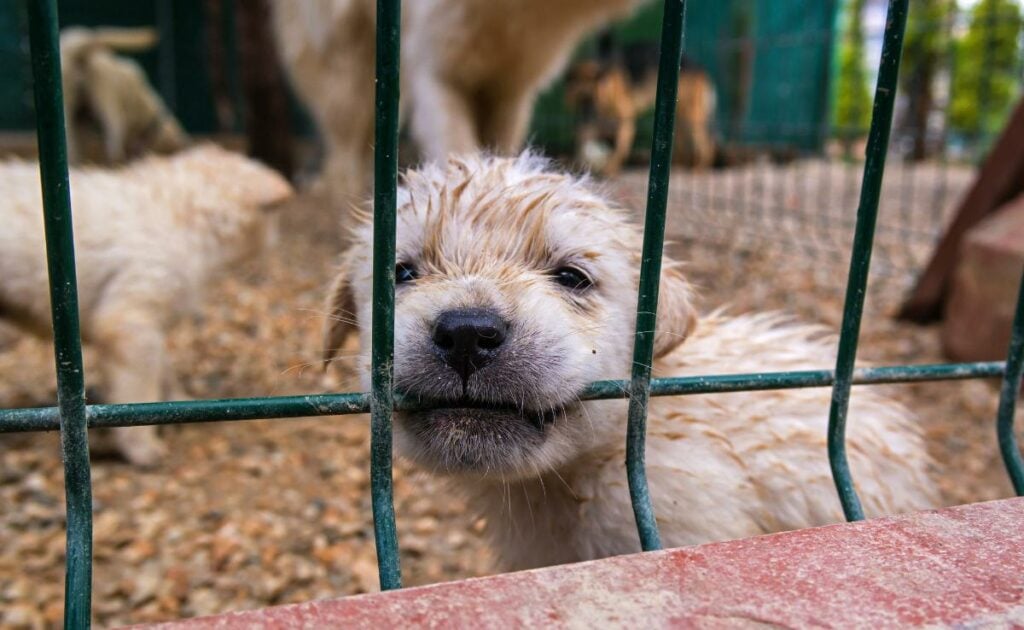
Ask about a specific puppy’s personality. If the breeder can’t tell you anything beyond the breed or age, that’s a red flag. A good breeder will tell you how the pup plays, sleeps, reacts to kids, and whether it’s more of a cuddler or chaos machine.
If all the puppies are shy, lethargic, or you’re not allowed to meet the mother? That’s another bad sign.
Other warnings include:
- Puppies separated from their mother before six weeks old
- Breeders with no interest in your lifestyle or home setup
- Sellers offering to ship the dog sight-unseen
Quick Check: Red Flags vs Green Flags When Visiting A Breeder
If you’re not sure whether a breeder is legit, use this side-by-side gut check. You don’t need to be a dog expert. You just need to know what feels off.
| Red Flags | Green Flags |
|---|---|
| Won’t let you visit the facility | Invites you into their home or kennel |
| Asks to meet in a public place | Wants you to see where the puppies were raised |
| Puppies look dirty, sick, or lethargic | Puppies are clean, active, and curious |
| Doesn’t know the puppy’s temperament | Can tell you about each puppy’s personality |
| Avoids or deflects questions | Answers confidently, with documentation |
| No proof of vaccinations or health checks | Provides vet records and genetic screening |
| Pushes for a fast sale | Encourages you to ask questions and take your time |
| Offers multiple breeds or “designer” mixes | Specializes in one breed with deep knowledge |
| No contract or return policy | Offers written agreement and lifetime return guarantee |
Quick Takeaway: If something feels rushed, vague, or hidden, it probably is. A good breeder has nothing to hide and everything to show.
What Sets A Responsible Breeder Apart?
The difference between a responsible breeder and a puppy mill isn’t just about cleanliness. It’s about intent, care, and accountability — the qualities that can’t always be seen in a photo.
A responsible breeder doesn’t just breed dogs. They raise them.
They know each puppy’s quirks, fears, favorite toys, and how they like to cuddle after meals. These breeders care where that puppy ends up, and they’ll ask you just as many questions as you ask them.
Behind the scenes, they are:
- Screening for hereditary health conditions
- Socializing puppies in the home
- Following ethical guidelines from breed clubs and veterinarians
- Offering written health guarantees and take-back contracts
They don’t rush sales. They don’t ship puppies to anyone with a credit card. And they will never meet you in a parking lot.
Quick Takeaway: An honest breeder wants the right home, not the fastest sale.
Step 3: Know The Gold Standard
So what does a good breeder actually look like?
They don’t just want your money. They want to know if you are a good fit for their puppy.
Reputable breeders treat their litters like family, not inventory. And they’ll tell you if a dog isn’t right for your lifestyle, even if it means losing a sale.
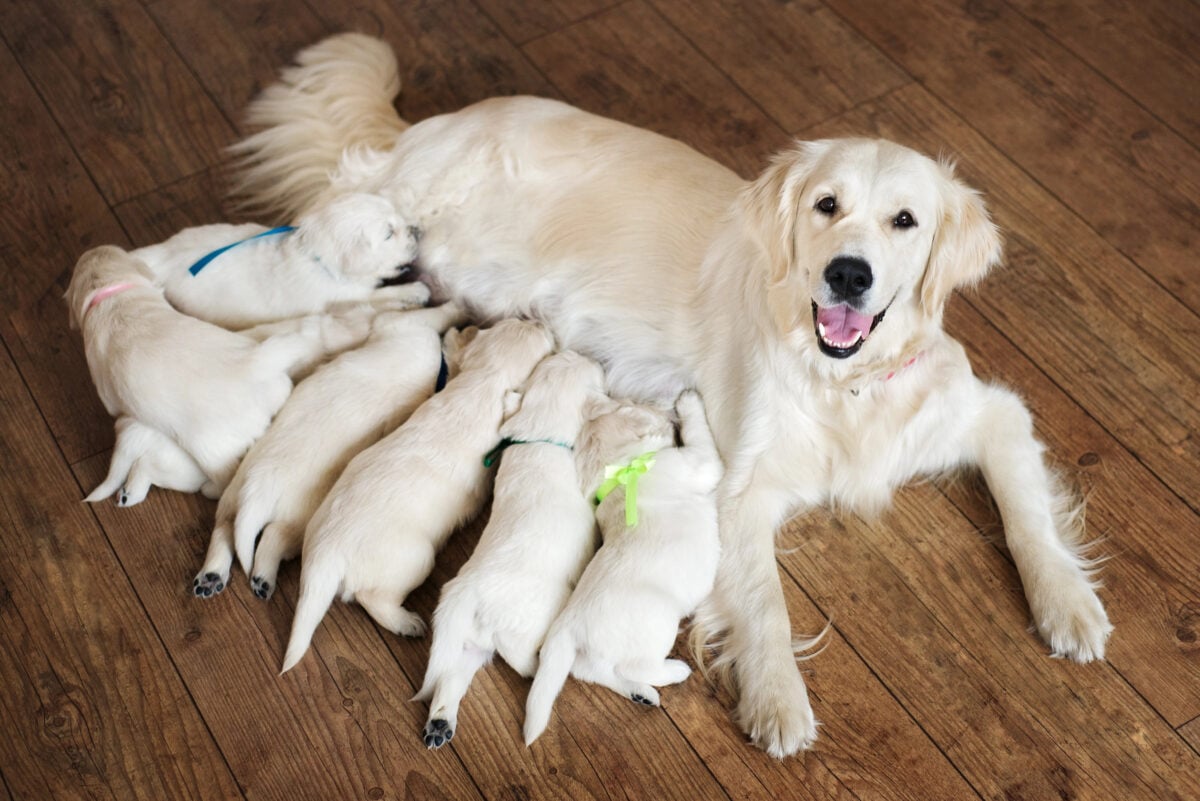
They study pedigrees for years, know every dog in their line, and choose matches carefully to support long-term health and temperament. They can tell you about the puppy’s grandparents, genetic traits, and common issues to watch for as your dog ages.
Yes, they may have a waiting list. They may charge more. But that extra time and cost? It protects you—and the puppy—for years to come.
Quick Takeaway: A good breeder is proud of how they raise their dogs, and they’re happy to prove it. No secrecy. No pressure. And no red flags.
Must-Have Qualities Of A Responsible Breeder
This list will help you recognize the difference between a good sales pitch and someone who truly cares. Think of it as your roadmap for how to find a reputable dog breeder who does things the right way.
Environment & Access
- Welcome you to visit the home or facility
- Introduce you to the puppy’s parents
- Keep puppies with the mother until at least 8 weeks old
Health Transparency
- Share vet records, vaccination history, and the name of their licensed veterinarian
- Screen for breed-specific health issues with documented tests
- Provide a written contract with a health guarantee and return policy
Breeding Focus & Ethics
- Specialize in one breed, not multiple designer mixes
- Register puppies with a recognized organization like the American Kennel Club (AKC)
- Offer or allow DNA testing for pedigree validation
Buyer Screening & Support
- Ask about your lifestyle, experience, and plans for the dog
- Avoid high-pressure tactics or rushed decisions
- Often have a waitlist, reflecting careful, ethical breeding
7 Questions Ethical Breeders Should Be Able To Answer
If your breeder can’t answer these questions—or dodges them—walk away.
- Can I meet the puppy’s parents? You should meet at least the mother, and observe how she interacts with people and pups.
- Where are the puppies raised? Look for indoor spaces with family exposure—not barns, garages, or cages.
- What health screenings have the parents had? Ethical breeders will mention OFA, CERF, or breed-specific certifications—and show results.
- How do you socialize the puppies? Early experiences matter. Good breeders expose pups to sounds, people, surfaces, and handling.
- What’s included in the contract? There should be a written agreement, health guarantee, and a return clause if needed.
- Will you take the puppy back if something doesn’t work out? The answer should always be yes—reputable breeders are committed for life.
- Can I call your vet for a reference? If they say no, that’s your sign to say goodbye.
Step 4: Finding A Breeder You Can Trust
You’ve seen the red flags. Now comes the real challenge: how to find a reputable dog breeder you can trust, not just one who responds fast and has puppies “ready now.”
The truth? Great breeders don’t always show up in the first five search results.
They’re not usually on Craigslist or throwing puppies into PayPal buttons. They’re quieter, more selective, and often worth the wait.

Where To Start Your Search
The best advice on how to find a reputable dog breeder? Start local, but smart.
- Ask your vet. They often know who’s reputable and whom to avoid.
- Talk to certified dog trainers. They can often spot the difference between well-balanced, socialized pups and those with behavioral issues.
- Check with breed-specific clubs. Most national and regional clubs maintain lists of approved breeders.
- Use AKC’s directories.
- Ask friends, family, or neighbors with healthy purebred dogs.
- Visit local dog shows or breed events. You’ll meet breeders in person and see how they interact with their dogs.
Red Flag? Any breeder who pops up instantly with puppies “ready now” in five different breeds. That’s inventory. Not intention.
How To Vet A Breeder Like A Pro
Once you’ve found a potential breeder, don’t just email and hope. Investigate.
- Google their name + kennel + reviews.
- Ask for video walkthroughs of their home or facility.
- Check how often they breed—more litters doesn’t mean better.
- Request health documentation before visiting, not after.
- Verify the puppy’s parents, not just the litter.
If they rush the conversation, can’t answer questions, or get cagey about showing paperwork? Trust your gut, and close the tab.
Understanding Breeder Certifications & Registrations
A registration certificate isn’t a guarantee. But it is a sign that the breeder follows minimum guidelines and is traceable through an official organization.
Here’s what you need to know:
| Label | What It Means | What It Doesn’t Mean |
|---|---|---|
| AKC Registered | The dog’s lineage is recorded | Doesn’t guarantee ethical practices |
| Bred with H.E.A.R.T. | Breeder follows health, education, accountability, responsibility, and tradition standards | Still requires due diligence |
| Breeder of Merit | Recognized for breed expertise and dedication to improving breed quality | Doesn’t mean all litters are equal |
| Local Licensing | Breeder follows state/local breeding laws | Laws vary wildly by state |
Pro Tip: Don’t confuse “papers” with proof. A flashy website and a few acronyms aren’t enough — you still need to ask hard questions.
Know Your State’s Laws: Breeder Regulations Across The U.S.
Breeding laws in the U.S. are wildly inconsistent. Some states require licenses and regular inspections. Others barely enforce basic animal welfare.
A breeder operating legally in one state could be shut down in another.
Before you commit, look up:
- Required breeder licenses and renewal rules
- Inspection reports or complaints (many are public record)
- Puppy “lemon laws” (in case of hidden illness post-sale)
Pro Tip: Check with your state’s Department of Agriculture or local humane society for region-specific regulations.
Step 5: Visit The Breeder
This is where everything becomes real. You’re about to meet the puppies.
But don’t let the wagging tails distract you. This visit is about observation, not emotion.
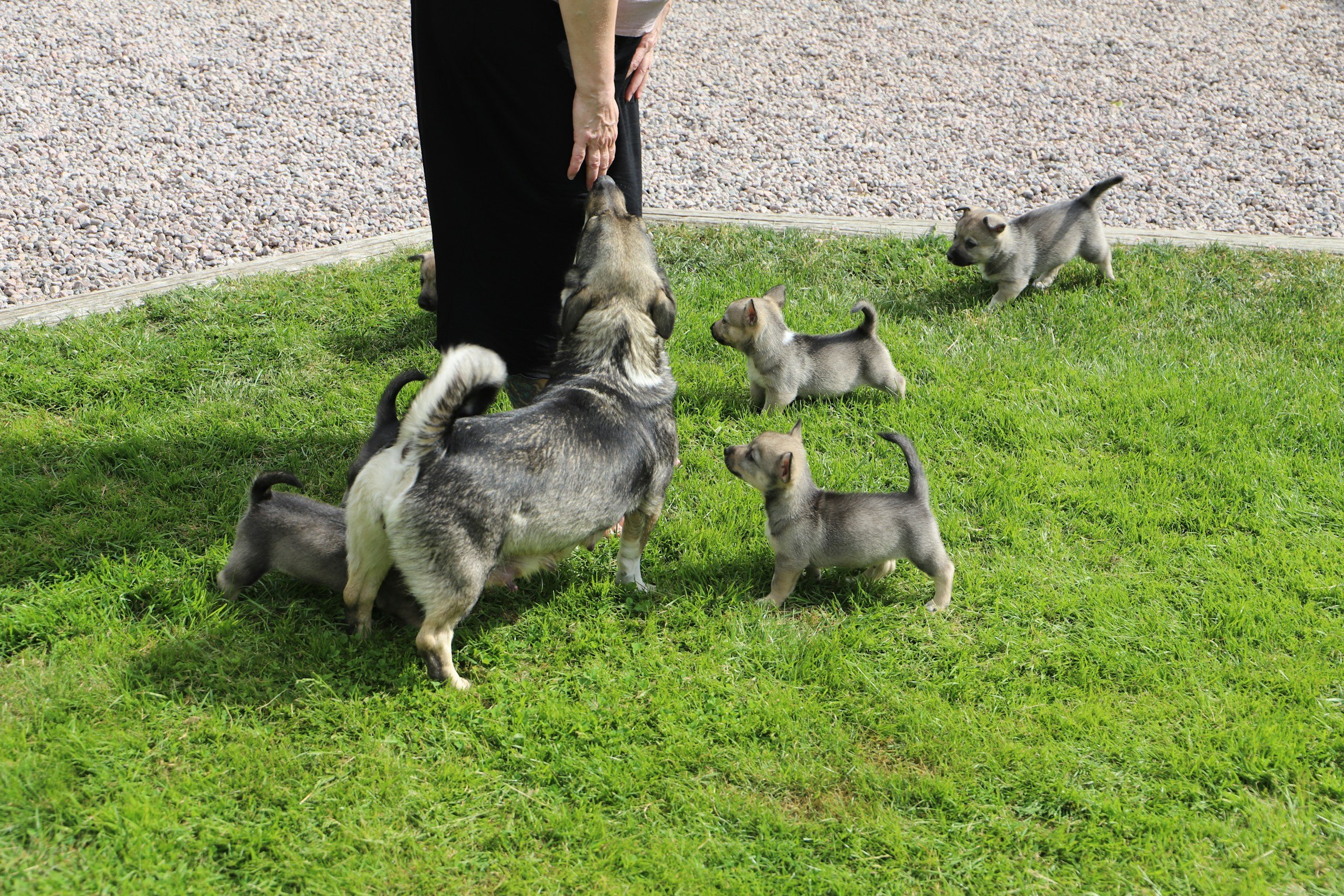
If the breeder is reputable, they’ll welcome your questions. They’ll be proud to show off their setup.
Nothing will feel hidden; nothing will feel rushed.
But if something’s off, you’ll feel it in your gut. Pay attention.
What You Should See, Smell & Hear
- The puppies are clean, alert, and curious. They may be shy at first, but they should engage with their environment—not cower or hide.
- The mother is present and healthy. She shouldn’t be thin, anxious, or kept in a separate area. Her behavior tells you everything.
- The space smells like dogs—but not like filth. A little odor is normal. Ammonia, feces, or rot? Walk away.
- You hear normal dog sounds. Happy yips, rustling, tail thumps. Not nonstop barking, whining, or silence.
- There’s enrichment. Toys, clean bedding, water bowls, safe flooring. No wire-bottom cages. No isolation pens.
Ask what the daily routine looks like and what the puppies are eating. Ask who’s home during the day and how they prep pups for new environments.
Quick Takeaway: A great breeder’s home or kennel feels like a place where puppies thrive, not just survive.
What Should a Puppy Really Cost — And What Should Be Included?
Let’s be real, a $300 purebred puppy “ready now” is a red flag, not a deal. Scammers and backyard breeders bank on your excitement. Ethical breeders invest in quality care, and it shows in the price.
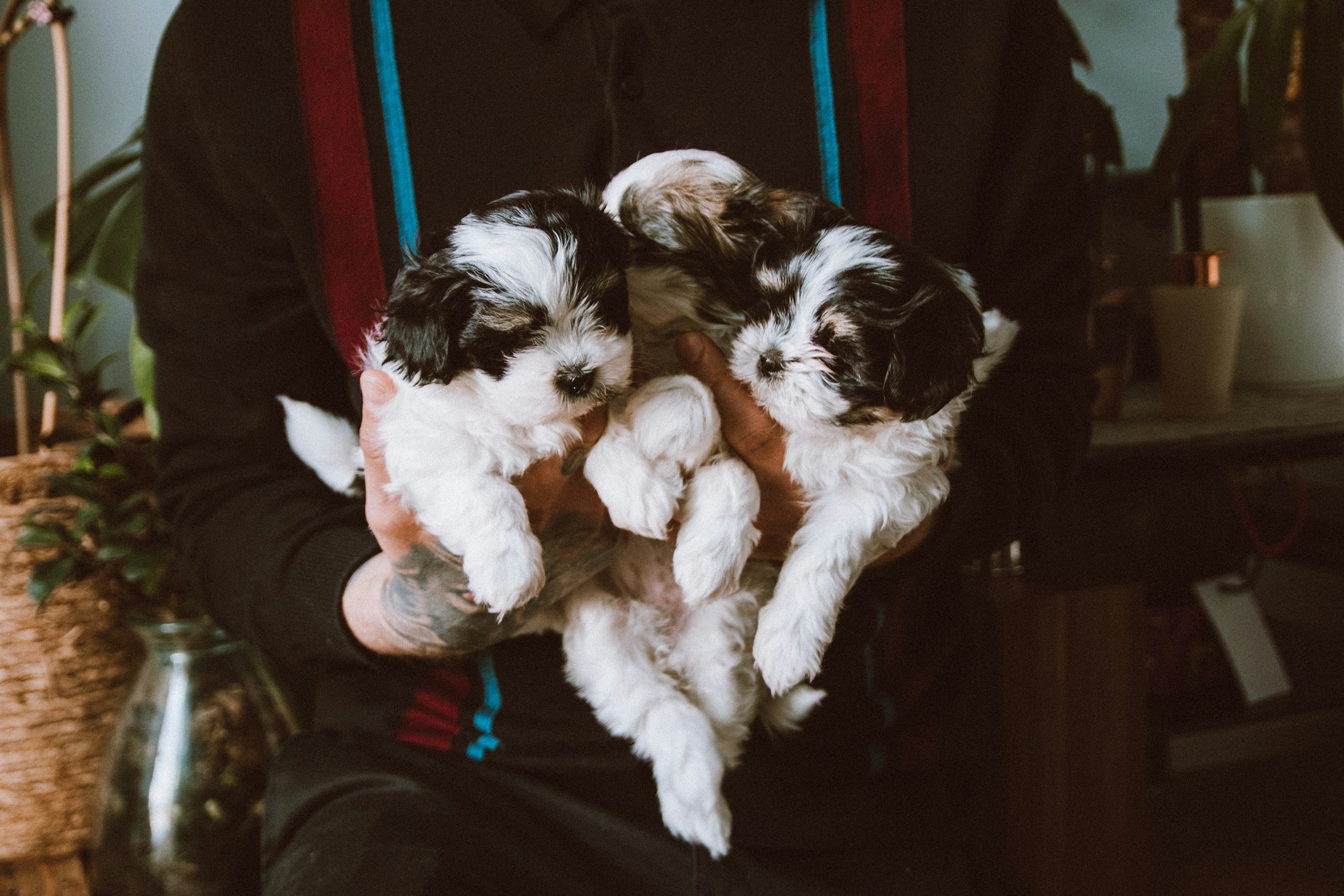
So … How Much Should You Expect To Pay?
- Small/medium breeds: $800–$2,500
- Large or specialty breeds: $1,200–$3,500+
- Rare or champion lines: Up to $5,000+
The range is big because so are the variables: lineage, location, vet care, and breeder reputation are all factors. A higher price doesn’t guarantee quality, but a too-low price almost always guarantees regret.
What’s Usually Included In The Cost?
When you find a reputable dog breeder, they will clearly outline what’s included before any money changes hands.
At minimum, expect:
- A written contract and health guarantee
- Vet exam records and initial vaccines
- Microchip or registration papers (if breed is registered)
- A clause stating that you must return the dog to the breeder if you can’t keep it
- Access to breeder support after you bring the puppy home
Some also include:
- Starter food
- Toys or a comfort item from the litter
- Information packets on care and training
- Spay/neuter agreements or conditions
Step 6: Buying A Puppy The Right Way
By now, you’ve asked the hard questions, done the digging, and spent time with the breeder and the puppies. If everything still feels right, here’s how you know you’re about to make the right decision.

Final Gut Check: Signs You’re Buying From The Right Breeder
- You’ve seen the puppy’s parents in person
- The breeder answered your questions without hesitation
- You received clear health records and a written contract
- The breeder welcomed your visit and didn’t rush your decision
- You know the return policy and what support is available after pickup
- The puppy is staying with the litter until at least 8 weeks
- You feel respected
What It Should Feel Like
When you find a reputable dog breeder, you don’t feel nervous. You feel steady.
You’re not walking away with a mystery. You’re walking away with trust.
You know exactly what you’re getting and who you’ll turn to if something goes wrong. And when the puppy finally comes home, there are no doubts — only tail wags.
The Other Option — Why Adopting A Dog Might Be The Better Fit
Not every family needs a purebred puppy. Not every heart wants to wait six months or ask a dozen questions. And not every dog who needs love comes with paperwork.
If you’re feeling even the slightest pull toward adoption, listen to it. That feeling might just lead you to the best dog you’ll ever meet.
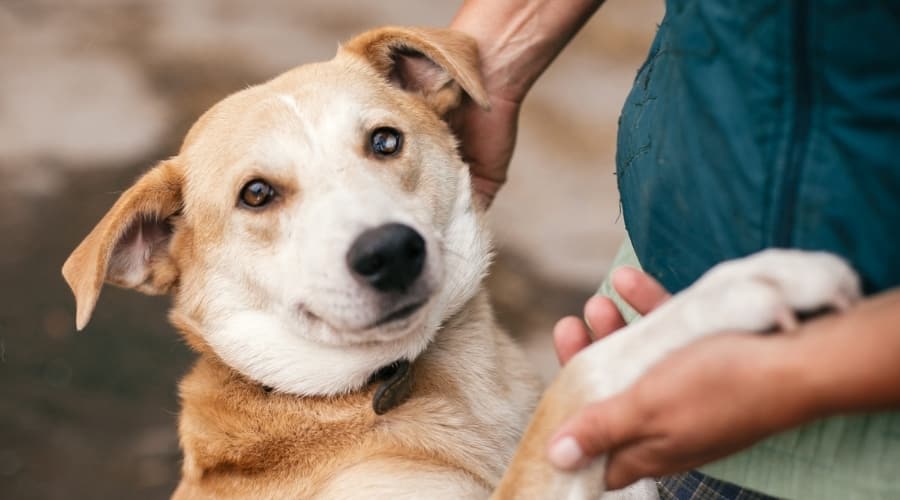
Shelter Dogs Deserve A Shot Too
Right now, thousands of dogs in shelters and rescues are waiting for someone like you.
- Many are already house-trained and socialized
- You can often meet them right away
- Adoption fees are far lower than breeder prices
- Rescues usually include spay/neuter, shots, and microchipping
- Volunteers know their personalities and can match you with a great fit
You’re not starting from scratch. You’re giving a dog a second chance, and getting something honest in return.
Frequently Asked Questions
Even smart, well-researched buyers hit that moment of panic where they wonder, “Wait, is this normal?” Here’s what most people wish they had asked before bringing home their new pup.
Don’t see your question? Ask us in the comments!
Is It Normal For Breeders To Ask Me Questions Too?
Yes. In fact, if they do not ask about your lifestyle, experience, or home, that is a problem.
Good breeders care where their puppies end up. It is not just business. It is matchmaking.
What If I Want To Return The Puppy Later?
Responsible breeders always include a return clause in their contract. If life changes or things do not work out, you should never have to abandon the dog or rehome them on your own.
If there is no return option, reconsider the breeder.
Are Backyard Breeders Always Bad?
Not always, but you need to be careful.
Some small, home-based breeders are deeply ethical and breed with care. Others are underregulated and profit-focused.
The difference is in transparency, health standards, and how they treat both dogs and buyers.
Can I Tell If A Breeder Is Ethical Just From Their Website?
Not reliably. Many puppy mills and scam breeders now use polished websites, fake testimonials, and even AI-generated puppy photos.
The website is a starting point, not proof. If you’re serious about learning how to find a reputable dog breeder, you’ll need to visit in person, verify health records, and ask smart questions.
How To Adopt From A Shelter
If breed specifics are not a priority for your family, adoption is one of the most meaningful choices you can make. Local shelters and rescues are filled with dogs of every age, size, and personality, many of whom are already house-trained, affectionate, and simply waiting for a safe place to call home. Read more in our guides: Rescue vs Breeder and Adopt Don’t Shop.




